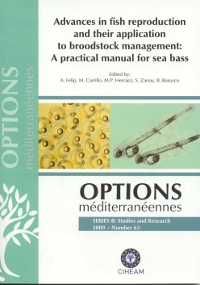| Article précédent | p. 75-80 | Article suivant |
Protocol L - An AFLP approach for assessment of maternal inheritance of gynogenetic sea bass [Pratical guide of protocols: methods of verification of the ploidy]
In gynogenesis induction, the use of biochemical markers (allozyme) has demonstrated to be a reliable method to confirm maternal inheritance in gynogenetic fish. The AFLP technology is a variation of the DNA fingerprinting technique based on visualization of polymorphic amplified DNA restriction fragments between samples. AFLP technology is robust and reliable and requires only small amounts of DNA, although it requires specific equipment. The objective of this protocol is to demonstrate the potential use of AFLP markers for determining the maternal inheritance of gynogenetic offspring in sea bass.
Lors de l'induction de la gynogénèse, l'utilisation de marqueurs biochimiques a montré être une méthode fiable pour confirmer la part d'héritage maternel chez le poisson gynogénétique. L'AFLP est une technique de détection de marqueurs moléculaires basée sur l'amplification aléatoire (par PCR) de fragments issus de la restriction de l'ADN. Bien qu'elle nécessite des équipements spécifiques, la technique AFLP est une technique fiable qui ne demande que de faibles quantités d'ADN. L'objectif de ce protocole est de démontrer l'intérêt d'utiliser la technique des marqueurs AFLP pour déterminer l'héritage maternel de la descendance gynogénétique chez le bar.
- [ Afficher ]
- [ Télécharger ]
- [ Exporter la citation ]
Vous pouvez télécharger la citation au format :
- [ Imprimer ]
-
Mots-clés
ADN, BAR, GENOME, GYNOGENESE, HEREDITE, PROTOCOLECiter cet article
Protocol L - An AFLP approach for assessment of maternal inheritance of gynogenetic sea bass [Pratical guide of protocols: methods of verification of the ploidy]. In : Felip A. (ed.), Carrillo M. (ed.), Herráez M.P. (ed.), Zanuy S. (ed.), Basurco B. (ed.). Advances in fish reproduction and their application to broodstock management: a pratical manual for sea bass. Zaragoza : CIHEAM / CSIC-IATS, 2009. p. 75-80. (Options Méditerranéennes : Série B. Etudes et Recherches; n. 63). http://om.ciheam.org/om/pdf/b63/00800918.pdf



